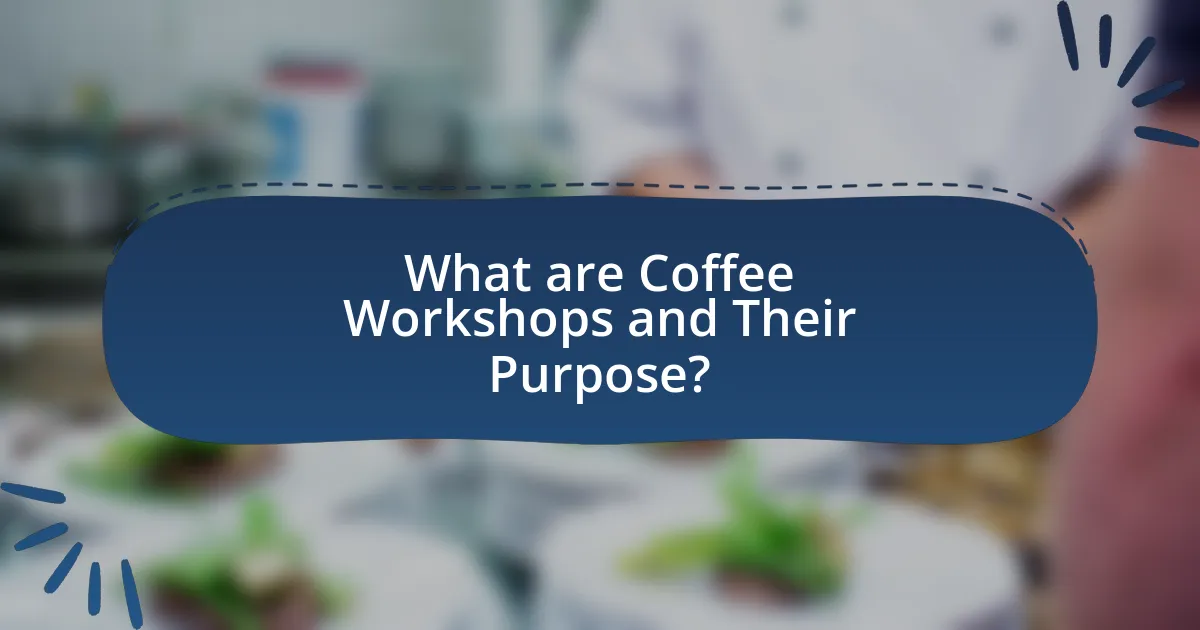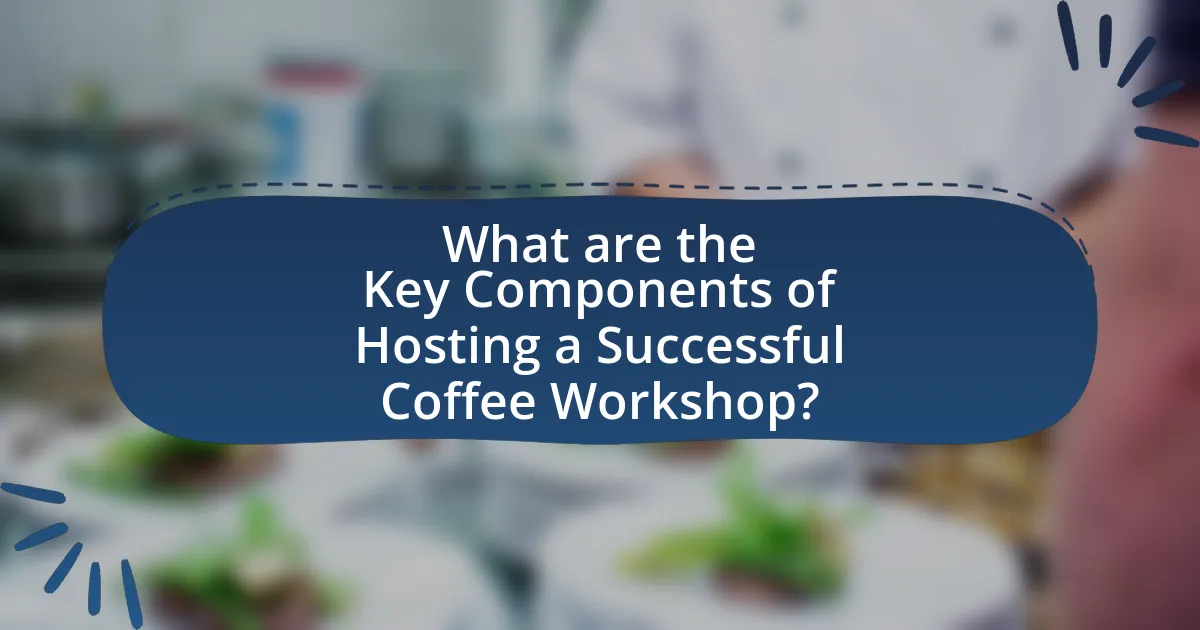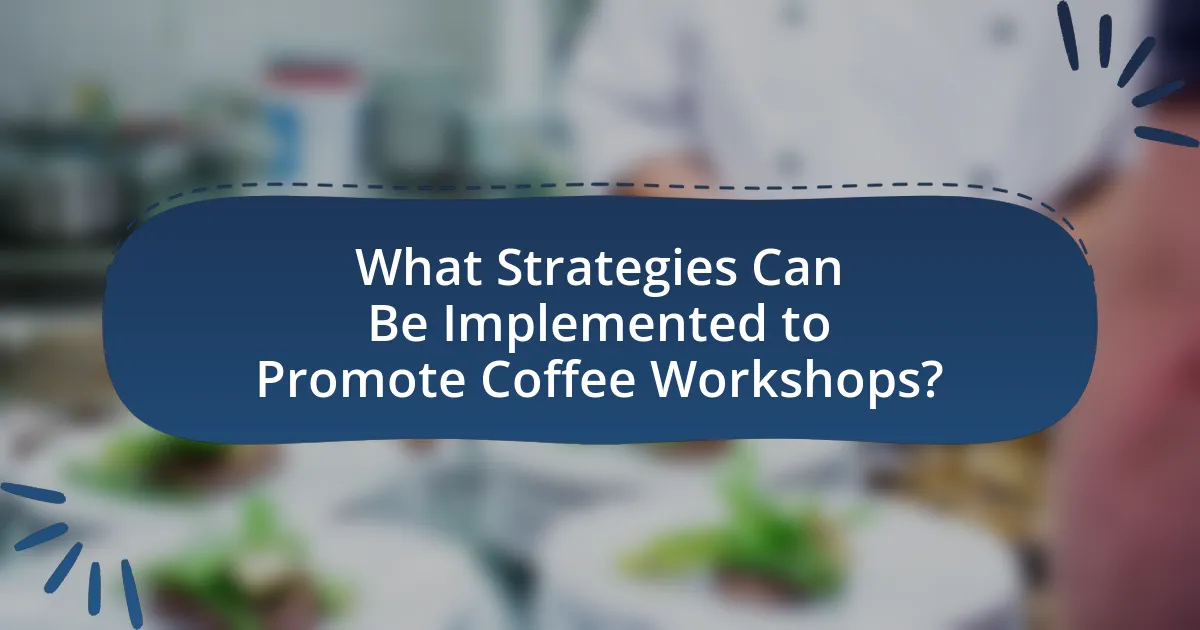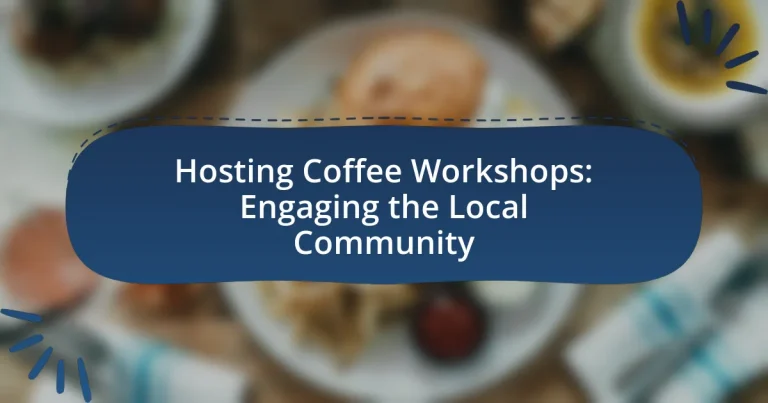Coffee workshops are structured events aimed at educating participants about various aspects of coffee, including brewing techniques, tasting methods, and its cultural significance. These workshops not only enhance knowledge and appreciation of coffee but also foster community engagement by bringing together coffee enthusiasts and local businesses. Key components for successful workshops include a well-defined curriculum, knowledgeable instructors, and effective marketing strategies. The article explores how coffee workshops engage the local community, the importance of these events for local businesses, and best practices for hosting them, including logistical considerations and promotional strategies.

What are Coffee Workshops and Their Purpose?
Coffee workshops are structured events designed to educate participants about various aspects of coffee, including brewing techniques, tasting methods, and the history of coffee. The primary purpose of these workshops is to enhance participants’ knowledge and appreciation of coffee, fostering a deeper connection to the beverage and its cultural significance. Workshops often include hands-on activities, allowing attendees to practice skills such as espresso making or latte art, which reinforces learning through experience. Additionally, coffee workshops serve as a platform for community engagement, bringing together coffee enthusiasts and local businesses, thereby promoting social interaction and collaboration within the community.
How do Coffee Workshops engage the local community?
Coffee workshops engage the local community by providing hands-on experiences that foster social interaction and skill development. These workshops often include activities such as coffee brewing techniques, tasting sessions, and discussions about coffee sourcing, which encourage participants to connect with one another and share their passion for coffee. Additionally, local coffee workshops frequently collaborate with nearby businesses and farmers, promoting community support and economic growth. For example, a study by the Specialty Coffee Association found that community-based coffee events can increase local business visibility and customer engagement, demonstrating the positive impact of such workshops on the local economy.
What types of activities are typically included in Coffee Workshops?
Coffee workshops typically include activities such as coffee tasting, brewing demonstrations, and discussions on coffee origins and processing methods. These activities engage participants by allowing them to experience different coffee flavors, learn various brewing techniques, and understand the journey of coffee from farm to cup. For instance, a workshop may feature a guided tasting session where participants sample different coffee beans and learn to identify flavor notes, enhancing their appreciation for coffee.
How do these activities foster community interaction?
Hosting coffee workshops fosters community interaction by providing a shared space for individuals to connect over a common interest in coffee. These workshops encourage participants to engage in hands-on activities, such as brewing techniques and tasting sessions, which facilitate conversation and collaboration among attendees. Research indicates that community-based activities, like workshops, enhance social ties and promote a sense of belonging, as evidenced by studies showing increased community cohesion in areas with regular social events.
Why are Coffee Workshops important for local businesses?
Coffee workshops are important for local businesses because they foster community engagement and enhance customer loyalty. By hosting these workshops, businesses create a platform for interaction, allowing customers to learn about coffee preparation and appreciation, which deepens their connection to the brand. Research indicates that experiential marketing, such as workshops, can increase customer retention rates by up to 70%, demonstrating the effectiveness of such initiatives in building lasting relationships. Additionally, these events can drive foot traffic and increase sales, as participants often purchase products related to their workshop experience, further supporting the local economy.
How can Coffee Workshops enhance brand visibility?
Coffee workshops enhance brand visibility by creating direct engagement opportunities with consumers, fostering community connections, and showcasing expertise in coffee. These workshops allow brands to demonstrate their products in an interactive setting, which can lead to increased word-of-mouth promotion and social media sharing. For instance, a study by the Specialty Coffee Association found that 70% of participants in coffee workshops reported a higher likelihood of purchasing products from brands they engaged with during these events. This direct interaction not only builds brand loyalty but also positions the brand as a knowledgeable leader in the coffee industry, further amplifying its visibility within the community.
What role do Coffee Workshops play in community building?
Coffee workshops play a significant role in community building by fostering social connections and enhancing local engagement. These workshops create a space for individuals to gather, share experiences, and learn about coffee culture, which strengthens community ties. Research indicates that community events, such as coffee workshops, can increase social cohesion and promote a sense of belonging among participants. For example, a study published in the Journal of Community Psychology found that communal activities enhance interpersonal relationships and encourage collaboration within neighborhoods. Thus, coffee workshops serve as a catalyst for community interaction and development.

What are the Key Components of Hosting a Successful Coffee Workshop?
The key components of hosting a successful coffee workshop include a well-defined curriculum, knowledgeable instructors, quality coffee sourcing, engaging activities, and effective marketing strategies. A well-defined curriculum ensures that participants learn essential skills and knowledge about coffee, such as brewing techniques and flavor profiles. Knowledgeable instructors enhance the learning experience by providing expert insights and answering questions. Quality coffee sourcing is crucial, as using high-quality beans can significantly impact the workshop’s overall experience. Engaging activities, such as tastings and hands-on brewing sessions, keep participants interested and involved. Finally, effective marketing strategies, including social media promotion and community outreach, help attract attendees and create buzz around the event. These components collectively contribute to a memorable and educational experience for participants.
What logistical considerations should be taken into account?
When hosting coffee workshops, key logistical considerations include venue selection, equipment availability, and participant capacity. The venue must accommodate the expected number of attendees while providing necessary amenities such as seating, tables, and accessibility. Equipment availability is crucial; this includes coffee brewing devices, grinders, and tasting supplies, which should be in sufficient quantity and in good working condition. Additionally, participant capacity should align with the workshop’s goals, ensuring an engaging experience without overcrowding. These factors are essential for a successful event, as they directly impact the overall experience and satisfaction of participants.
How do venue selection and setup impact the workshop experience?
Venue selection and setup significantly impact the workshop experience by influencing participant engagement, comfort, and learning outcomes. A well-chosen venue that is accessible and conducive to interaction fosters a positive atmosphere, encouraging attendees to participate actively. For instance, research indicates that environments with adequate lighting, comfortable seating, and appropriate acoustics enhance focus and retention of information. Additionally, the layout of the space can facilitate collaboration; for example, circular seating arrangements promote discussion, while traditional rows may hinder interaction. Therefore, the right venue and setup not only enhance the overall experience but also contribute to the effectiveness of the workshop in achieving its educational goals.
What equipment is essential for a successful Coffee Workshop?
Essential equipment for a successful Coffee Workshop includes high-quality coffee brewing devices, grinders, scales, and tasting cups. High-quality brewing devices, such as pour-over setups or espresso machines, ensure optimal extraction of flavors, while grinders are crucial for achieving the right grind size for different brewing methods. Scales provide precise measurements for coffee and water, which is vital for consistency in brewing. Tasting cups allow participants to evaluate the coffee’s aroma and flavor effectively. These tools collectively enhance the educational experience and engagement of participants in the workshop.
How can facilitators effectively engage participants?
Facilitators can effectively engage participants by employing interactive techniques such as group discussions, hands-on activities, and real-time feedback. These methods encourage active participation and foster a collaborative environment. Research indicates that interactive learning increases retention rates by up to 75%, compared to traditional lecture-based approaches, which typically yield retention rates of around 5-10%. By integrating these interactive elements into coffee workshops, facilitators can create a dynamic atmosphere that not only enhances learning but also strengthens community bonds.
What teaching methods work best for Coffee Workshops?
Interactive hands-on learning methods work best for Coffee Workshops. These methods engage participants directly in the coffee-making process, allowing them to practice skills such as brewing, tasting, and understanding coffee origins. Research indicates that experiential learning enhances retention and understanding, making it particularly effective in culinary settings. For instance, a study published in the Journal of Culinary Science & Technology found that hands-on activities significantly improved participants’ knowledge and skills compared to traditional lecture-based approaches. This evidence supports the effectiveness of interactive methods in fostering a deeper connection to coffee culture and techniques during workshops.
How can facilitators create an inclusive environment?
Facilitators can create an inclusive environment by actively promoting participation from all attendees and ensuring diverse voices are heard. This can be achieved through strategies such as using open-ended questions, encouraging sharing of personal experiences, and implementing ground rules that respect all contributions. Research indicates that inclusive practices, such as these, enhance group dynamics and foster a sense of belonging, which is crucial in community engagement settings like coffee workshops. For instance, a study by the National Coalition for Dialogue & Deliberation highlights that inclusive facilitation leads to more effective collaboration and innovation within diverse groups.

What Strategies Can Be Implemented to Promote Coffee Workshops?
To promote coffee workshops, leveraging social media platforms is essential for reaching a wider audience. Social media allows for targeted advertising, engaging content, and community interaction, which can significantly increase visibility and interest in the workshops. For instance, a study by the Pew Research Center indicates that 69% of adults in the U.S. use social media, making it a powerful tool for marketing events. Additionally, collaborating with local coffee shops and influencers can enhance credibility and attract participants through established networks. Hosting free introductory sessions or offering discounts for early sign-ups can also incentivize attendance, as research shows that promotional offers can increase participation rates by up to 30%.
How can social media be utilized for promotion?
Social media can be utilized for promotion by creating targeted campaigns that engage the local community and showcase the coffee workshops. Platforms like Facebook and Instagram allow businesses to reach specific demographics through ads, event pages, and engaging content, which can increase visibility and attendance. For instance, a study by the Pew Research Center indicates that 69% of adults in the U.S. use Facebook, making it an effective platform for local event promotion. Additionally, using hashtags and location tags can enhance discoverability, allowing potential attendees to find the workshops easily.
What types of content resonate most with potential participants?
Informative and visually engaging content resonates most with potential participants in coffee workshops. This includes detailed descriptions of coffee brewing techniques, high-quality images of coffee preparation, and videos demonstrating the workshop experience. Research indicates that 70% of consumers prefer to learn about products through content rather than traditional advertising, highlighting the effectiveness of educational and visually appealing materials in attracting interest. Additionally, testimonials and success stories from previous participants can enhance credibility and encourage new attendees, as social proof significantly influences decision-making in community events.
How can partnerships with local businesses enhance outreach?
Partnerships with local businesses can enhance outreach by leveraging their established customer bases and community trust. When organizations collaborate with local businesses, they gain access to a wider audience that is already engaged and familiar with the business, increasing visibility and participation in events like coffee workshops. For instance, a study by the American Independent Business Alliance found that local businesses contribute to community engagement, with 68% of consumers preferring to support local over national brands. This preference can translate into higher attendance and interest in community events, thereby amplifying outreach efforts.
What are effective offline marketing strategies?
Effective offline marketing strategies include hosting community events, utilizing direct mail campaigns, and engaging in local partnerships. Hosting community events, such as coffee workshops, allows businesses to connect directly with potential customers, fostering relationships and brand loyalty. Direct mail campaigns can effectively reach targeted demographics, with studies showing that 79% of consumers can recall the brand after receiving direct mail. Local partnerships, such as collaborating with nearby businesses for cross-promotions, can enhance visibility and attract new customers through shared audiences. These strategies leverage personal interaction and community involvement, which are crucial for building a strong local presence.
How can community boards and local events be leveraged for promotion?
Community boards and local events can be leveraged for promotion by actively engaging with local stakeholders and utilizing platforms for visibility. By collaborating with community boards, businesses can gain access to a network of residents and organizations, enhancing outreach efforts. For instance, promoting coffee workshops through community boards can attract local participants, as these boards often serve as information hubs for events and activities. Additionally, hosting workshops at local events allows for direct interaction with potential customers, fostering relationships and encouraging word-of-mouth promotion. Research indicates that community engagement can increase event attendance by up to 30%, demonstrating the effectiveness of this strategy in driving local interest and participation.
What role do flyers and posters play in attracting participants?
Flyers and posters serve as effective tools for attracting participants by providing visually engaging and informative content that captures attention. These materials communicate essential details about the event, such as date, time, location, and purpose, making it easy for potential attendees to understand what is being offered. Research indicates that visual stimuli can enhance recall and interest; for instance, studies show that colorful and well-designed flyers can increase engagement by up to 50%. By strategically placing these promotional materials in high-traffic areas, organizers can reach a broader audience, thereby increasing the likelihood of participation in community events like coffee workshops.
What are Best Practices for Hosting Coffee Workshops?
Best practices for hosting coffee workshops include selecting a suitable venue, creating an engaging curriculum, and promoting the event effectively. A suitable venue should accommodate the expected number of participants and provide necessary equipment, such as coffee brewing tools and seating. An engaging curriculum should cover various aspects of coffee, including brewing techniques, flavor profiles, and tasting sessions, ensuring participants gain hands-on experience. Effective promotion can be achieved through social media, local community boards, and partnerships with local coffee shops, which can increase attendance and community involvement. These practices are supported by successful workshops that have reported higher participant satisfaction and retention rates when following these guidelines.
How can feedback be effectively gathered from participants?
Feedback can be effectively gathered from participants through structured surveys and interactive discussions. Structured surveys, which can include multiple-choice questions and open-ended responses, allow participants to provide quantitative and qualitative feedback efficiently. Interactive discussions, such as focus groups or feedback sessions, encourage participants to share their thoughts in a conversational format, fostering deeper insights. Research indicates that using a combination of these methods increases response rates and the quality of feedback received, as participants feel more engaged and valued in the process.
What follow-up strategies can help maintain community engagement?
Follow-up strategies that can help maintain community engagement include regular communication, feedback solicitation, and event follow-ups. Regular communication through newsletters or social media updates keeps community members informed and connected. Soliciting feedback after events allows participants to share their experiences and suggestions, fostering a sense of involvement. Additionally, following up on previous workshops by sharing outcomes or future plans reinforces the community’s role in the ongoing process. Research indicates that consistent engagement efforts can lead to a 30% increase in community participation over time, demonstrating the effectiveness of these strategies.

